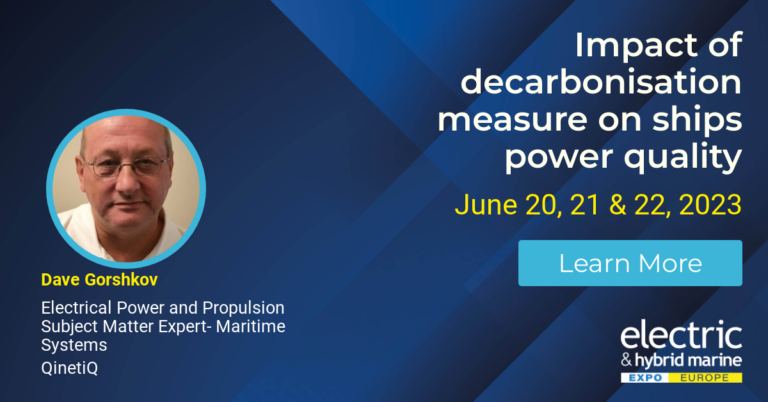Dave Gorshkov, electrical power and propulsion subject matter expert, maritime systems at QinetiQ, discusses the impact of decarbonization measures on ships’ power quality, ahead of his presentation on the same topic at this year’s Electric & Hybrid Marine Expo Europe, June 20, 21, 22, in Amsterdam, Netherlands.
 Dave is an experienced chartered electrical engineer with sea-going experience as a chief electrical engineer and shore-based fleet electrical superintendent. Recent projects include new ship designs incorporating the latest ‘hybrid’ Li-ion energy storage systems (ESS) used as synthetic generators to reduce carbon emissions ahead of IMO 2030, as well as energy recovery and power quality projects. Dave has now taken up a role with QinetiQ Maritime Systems as the electrical power and propulsion subject matter expert, based in Haslar, supporting projects on ‘gray’ ships and commercial shipping and port operations.
Dave is an experienced chartered electrical engineer with sea-going experience as a chief electrical engineer and shore-based fleet electrical superintendent. Recent projects include new ship designs incorporating the latest ‘hybrid’ Li-ion energy storage systems (ESS) used as synthetic generators to reduce carbon emissions ahead of IMO 2030, as well as energy recovery and power quality projects. Dave has now taken up a role with QinetiQ Maritime Systems as the electrical power and propulsion subject matter expert, based in Haslar, supporting projects on ‘gray’ ships and commercial shipping and port operations.
Electric & Hybrid Marine Technology International recently caught up with Dave to hear his thoughts on some of the careful considerations that must be made when seeking to decarbonize a fleet.
What is your presentation about?
This presentation will look at the energy efficiency steps ship operators are taking toward a greener future for the shipping industry, including cruises and ferries, gray ships, commercial vessels and ports and how these are now impacting ships’ Power Quality (PQ) and Total Harmonic Distortion (THD) levels. This presentation will identify some of the concerns that operators need to be aware of when implementing decarbonization and energy reduction solutions using variable-frequency drives (VFDs), LEDs, etc, and how they may negatively impact class rules for limits of THD and associated damage to the ships’ electrical systems.
What are some of the main impacts of alternative propulsion/energy management systems on ships’ PQ and THD levels – what might surprise shipowners the most?
Many shipowners and operators are looking at the forthcoming IMO2030 and indeed IMO2050 regulations as a bit of a challenge. Some owners are moving to various solutions to reduce energy usage while not really appreciating that the very solutions they are introducing to reduce energy use, GHG and costs are in fact potentially damaging their ships’ systems and introducing additional opex to repair damage done via some of these energy-saving solutions. Owners and operators also need to be mindful of ‘class limits’ for THD, which they need to maintain at certain levels for the safety of the vessel – THD can cause significant damage if not kept under review.
Have you seen first-hand any evidence of such problems or issues?
Yes indeed. Following a head office directive to reduce emissions and thus fuel usage and GHG via the introduction of variable frequency drives, I have seen THD increase significantly beyond class limits (that’s a ship stopping situation, by the way!) and cause additional motor failures, cable damage and increased ‘flicker’ in lighting systems. I have also seen electronic devices installed in cabins fail to the point of causing a small fire. In one serious case, the main high-voltage generator failed, causing an engine room explosion in the HV terminal connections.
What is your advice to prevent such problems?
There are a number of ways that ‘electrification’ of certain systems can reduce energy consumption. High-speed devices such as fans and HVAC are obvious candidates for VFDs and there is nothing wrong with these devices or methods of energy reduction, as long as you design the installation correctly and are aware of the problems that can be caused by reduced power quality and increased THD. Before you embark on any alterations, carry out a THD survey to understand your starting point. You should do this as a matter of routine in order to verify you are below class limits as well. Not all AC motors can use VFDs so be clear that the ‘target’ motors are able to be controlled in this way and have the correct levels of insulation. VFDs can introduce additional heating to motors and generators, causing hotspots. Also, look to apply filtering not only between the VFD and the motor but also between the VFD and the supply network. This helps avoid increasing the spread of high-speed switching harmonics across the power supply network and causing problems elsewhere. THD can be lowered using active systems and I have used these to great effect on large passenger ships where they have had THD in excess of 8%, and brought it back to around 4%. Some ships I have surveyed have been in excess of 13%.
What role could classification societies take to help improve the current situation?
Class and Flag both need to ensure that they are communicating the need to keep THD low and also spell out the issues that can be caused if harmonics are allowed to run unchecked. There are different limits applied in different ways by different class societies and they need to better understand how THD can be controlled as the marine industry rushes to use more VFDs, converters and LEDs within its systems to reduce energy use and GHG emissions, etc. Perhaps a workshop needs to be held to better understand some of these issues and the damage that can be done if they are ignored.
What is the key message you would like to convey at this year’s Electric & Hybrid Marine Expo Europe?
My key message would be ‘measure your THD’ – it’s a good indicator as to the health of your ship’s electrical systems. Be very wary about taking the energy savings steps given by these various systems without understanding what your THD is and what it will be once the upgrades have been done.
I appreciate opex and capex are different budgets but no one will thank you if you cause a serious electrical systems failure or, worse, a major fire on your ship following the introduction of energy-saving systems and architectures that were not fully evaluated for your particular vessels.
Don’t miss Dave’s presentation, which is part of the ‘Enabling Marine Decarbonization’ session on Day 1 (Tuesday, June 20) of the conference (rates apply) at this year’s Electric & Hybrid Marine Expo Europe. Please visit the website for the full program, to reserve your place at the conference and to register for your free exhibition fast-track entry pass.




